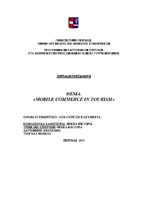Mobile commerce in tourism

Προβολή/
Λέξεις κλειδιά
Ηλεκτρονικό εμπόριο ; Κινητό ηλεκτρονικό εμπόριο ; Τουρισμός ; e-Commerce ; m-Commerce ; TourismΠερίληψη
Οι τεχνολογίες πληροφορικής έχουν αλλάξει τον τρόπο που πραγματοποιείται το εμπόριο αγαθών και υπηρεσιών. Η αγορά και πώληση προϊόντων ή υπηρεσιών με ηλεκτρονικά μέσα, δηλαδή το ηλεκτρονικό εμπόριο, έχει παρουσιάσει σημαντική άνθηση κατά τις δύο τελευταίες δεκαετίες (Tomaetal, 2013). Μεταξύ των επιχειρηματικών κλάδων που οι τεχνολογίες πληροφορικής και επικοινωνιών (ΤΠΕ) έχουν προκαλέσει σημαντικές αλλαγές στη δομή και τον τρόπο λήψη των αντίστοιχων υπηρεσιών, αποτελεί ο κλάδος του τουρισμού. Πλέον, το ηλεκτρονικό εμπόριο αποτελεί το κυρίαρχο μέσο παρουσίασης τουριστικών πληροφοριών και αγοροπωλησίας τουριστικών υπηρεσιών (Tomaetal, 2013). Η ταχεία εξέλιξη της τεχνολογίας κινητών τηλεφώνων, έχει οδηγήσει σε άνθηση του κινητού ηλεκτρονικού εμπορίου, που προβλέπεται να παρουσιάσει υψηλούς ρυθμούς ανάπτυξης και να επηρεάσει το ηλεκτρονικό εμπόριο σε όλους τους επιχειρηματικούς κλάδους, μεταξύ των οποίων και τον κλάδο του τουρισμού (GoldmanSachs, 2014). Οι χρήστες κινητών τηλεφώνων μπορούν να μοιραστούν και να έχουν πρόσβαση σε πληροφορίες σχετικά με τον τουρισμό πριν, μετά και κατά τη διάρκεια ενός ταξιδιού, γεγονός που καθιστά την ταξιδιωτική εμπειρία πιο ευχάριστη και πιο εύκολη. Πέραν της παρουσίασης πληροφοριών και τη βελτίωση της εμπειρίας τουρισμού, οι εφαρμογές για κινητές συσκευές μπορούν να συστήσουν δραστηριότητες και υπηρεσίες στους χρήστες σύμφωνα με την τοποθεσία που βρίσκεται ο χρήστης (Pawaraetal, 2014). Στην παρούσα έρευνα γίνετε ανασκόπηση ιστότοπων παραδοσιακού και κινητού ηλεκτρονικού εμπορίου που υποστηρίζουν την οργάνωση και διεξαγωγή ταξιδιών. Παρουσιάζονται διάφορες μορφές εφαρμογών κινητού ηλεκτρονικού εμπορίου, διαθέσιμες στους χρήστες με ή χωρίς διαθεσιμότητα σύνδεσης στο διαδίκτυο. Στη συνέχεια, παρουσιάζεται μια νέα υπηρεσία στο τομέα του κινητού ηλεκτρονικού εμπορίου, η δυνατότητα checkin σε ξενοδοχειακές μονάδες χωρίς την ανάγκη αναμονής στην ουρά της ρεσεψιόν αλλά μέσω κινητού τηλεφώνου και τη δυνατότητα ξεκλειδώματος της πόρτα δωματίου με χρήση κινητής συσκευής (keylesscheck-in). Παρουσιάζονται τα πλεονεκτήματα και μειονεκτήματα της αντίστοιχης υπηρεσίας, οι λειτουργικές απαιτήσεις σχετικών υπηρεσιών, οι απαιτήσεις υλικού προκειμένου να μπορεί να λειτουργήσει αποτελεσματικά η νέα υπηρεσία και τα κριτήρια της απόφασης ενός ξενοδοχείου σχετικά με πιθανή υιοθέτηση της νέας υπηρεσίας. Τέλος παρουσιάζονται τα συμπεράσματα της έρευνας και προτάσεις για μελλοντικές έρευνες στον τομέα του κινητού ηλεκτρονικού εμπορίου και του τουρισμού.


